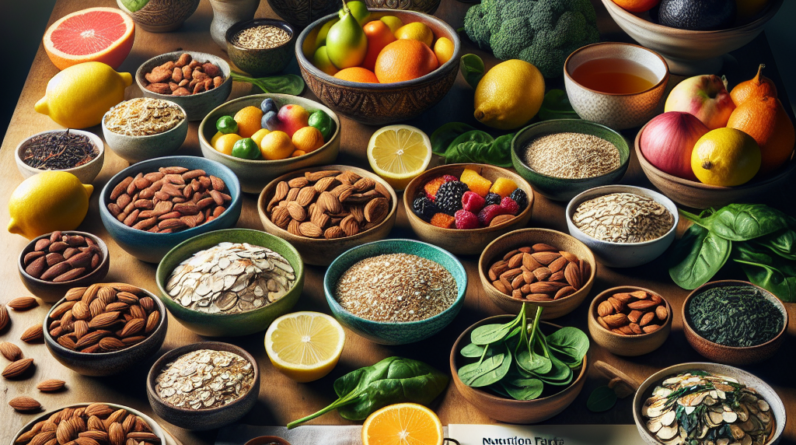
1. Understanding Seasonal Produce
Why Seasonality Matters
One of the first things I learned on my journey to eating organic on a budget is the power of seasonal produce. When fruits and vegetables are in season, not only are they fresher and tastier, but they’re also way cheaper. It’s kinda like getting a sale on food just because Mother Nature is doing her thing! This means that I get to enjoy all the great flavors and nutrients that produce has to offer, while also saving money.
Get a Huge Discount and Bonus! Try for 90 Days Risk Free
Another cool thing is that seasonal produce is usually grown closer to home. This means it doesn’t need to travel as far to get to me, which cuts down on transportation costs and… you guessed it, prices for us. Plus, buying in season can help support local farmers, which is always a win in my book!
So, what should you eat when? Well, I’ve found that checking local farmers’ markets or even apps focused on seasonal veggies can be a game-changer. Not only does it expand my meal options, but it also keeps things fresh and exciting in the kitchen.
Buying in Bulk
Buying in bulk has totally transformed how I shop. Let me tell you, I often head to bulk food stores or sections with a shopping list of staples like grains, nuts, and dried beans. Not only can I buy what I really need, but I can usually score way better prices compared to those pre-packaged options. It feels kind of like being in a treasure hunt, you know?
And the best part? I can mix and match what I buy. There’s something super satisfying about crafting my own trail mix or muesli from a variety of dried fruits and nuts. That custom touch makes my snacks feel extra special, and it’s often healthier, too, which is a huge plus!
Just keep in mind that while bulk buying can save you cash, it’s essential to have a plan. I once bought a ridiculous amount of quinoa, thinking I would eat it every day, but ended up with half of it sitting and gathering dust. So, before you fill your cart, make sure you have solid meal ideas that will actually use those bulk buys!
Community Supported Agriculture (CSA)
Oh man, joining a CSA was such a smart move for me! Basically, you buy a share of a local farm’s harvest, and every week you get a box full of fresh, seasonal produce. It’s like a surprise gift that keeps on giving! Not only am I getting organic veggies, but I get to try new things that I might have never picked up from the store.
Plus, it helps me get creative in the kitchen. With a mystery box each week, I’ve learned to explore new recipes and techniques. It forces me out of my comfort zone, and I’ve discovered some seriously delicious meals because of it. That’s what I call a win-win!
However, I do need to mention one pitfall. Sometimes I get too many veggies at once, and it’s a race against time to use them before they go bad. If you sign up for a CSA, be ready for some meal-planning sessions to mitigate food waste!
Get a Huge Discount and Bonus! Try for 90 Days Risk Free
2. Meal Planning and Preparation
Setting a Weekly Menu
Meal planning has been a total lifesaver for me. By setting up a weekly menu, I can easily map out what I need to shop for, which helps me avoid those last-minute takeout temptations. Trust me, once you get into the groove of Sunday meal preps, you won’t look back!
What I like to do is pick a few recipes that incorporate similar ingredients. This way, I can utilize the same veggies across various meals and not end up with half a zucchini hiding in my fridge. It’s about being savvy with your ingredients, ya know?
Another great tip is to write it all down. Having my meals planned helps me not only with shopping but also with staying organized throughout the week. Plus, it’s such a good feeling to cross off meals that I’ve made!
Cooking in Batches
Cooking in batches is where I really save time and money. When I make meals like soups, stews, or casseroles, I always double the recipe and freeze half. That way, I have homemade organic meals ready to go for those busy nights when cooking becomes a chore.
Need a Serious Energy BOOST? Huge Discount Try for 90 Days Risk Free
Batch cooking also means I can control what goes in my food. No hidden ingredients or unexpected sugars, just good wholesome stuff that I know my body will love. I often whip up big batches of things like chili or vegetable curry, which make great leftovers and freeze well.
Don’t forget to label everything! I can’t tell you how many times I’ve played the guessing game with random frozen containers. A simple label can save you from surprise meals that might not feel appealing two months later!
Making Leftovers Work
Leftovers have become my best friend in the quest to eat healthy and frugally. Instead of seeing it as an end of a meal, I’ve turned it into a new culinary adventure. You’d be amazed at how creative you can get by remixing last night’s dinner.
For instance, leftover roasted vegetables can be transformed into salads, wraps, or even a frittata. Instead of a boring plate of reheated food, I feel like I’m repurposing my own cooking into something fresh and exciting!
Using leftovers not only saves money but also reduces food waste. I love knowing that I’m making the most of my purchases while fueling my body with good food. Plus, it really takes the stress out of “what’s for dinner?”
3. Smart Shopping Techniques
Using Coupons and Loyalty Programs
So, I admit, I wasn’t the biggest fan of coupons before I started my budget-friendly journey. But now? They’re a staple in my shopping routine! I’ve spent just a little time learning how to find organic-specific coupons, and it has paid off huge dividends.
Also, signing up for grocery store loyalty programs can be a game changer. Most of them offer deals and discounts that aren’t available to the general public. I never thought I’d be the person checking my grocery app for savings before I left, but here we are! It’s become a small thrill for me each week.
Before heading out, I also make it a habit to check stores for any running promotions on organic products. Trust me, a little time invested can lead to some nice savings at checkout!
Comparing Prices Locally
When I started being conscious of my grocery spending, I did a little homework on where to shop for the best prices. Taking time to compare prices between my local stores and farmers’ markets was eye-opening. I didn’t realize just how much difference there could be!
I found that stores often have rotating sales, and sometimes it pays to drive a little further for fresher, cheaper produce. Plus, shopping around more often equates to discovering hidden gems in the aisles! It feels great to stumble upon that deal on organic apples just because I decided to try a new store.
Keeping a list of store prices for my go-to items has helped me navigate the grocery aisles like a pro. My friends tease me, but being a savvy shopper has become one of my own personal triumphs!
Shopping Seasonal Sales
Lastly, leveraging seasonal sales has been a huge part of my budget-friendly shopping strategy. As I mentioned earlier, I keep an eye out for items that are at their peak season and often on sale. It’s like a little cheat code for my grocery bill!
Good Health Solution is Easier Than Most People Think!
Take a Look for Yourself!
When a fruit or vegetable is in surplus, the prices tend to drop, which means more savings for me. I’ve recently bought a ton of strawberries at a steal of a price – perfect for making smoothies or even a fresh salad!
Planning my grocery list around these sales not only keeps my meals fresh but also allows me to splurge a little on organic varieties without feeling guilty. Trust me, it’s worth the efforts!
4. Cooking at Home
Why Home Cooking is Key
Cooking at home has been the most impactful choice I’ve made for both my health and wallet. Eating out, while fun, often comes with inflated prices, and I don’t always know what’s going into my food. By preparing meals myself, I gain total control over the ingredients and portion sizes.
Moreover, preparing my meals has allowed me to experiment way more. I’ve transitioned from being a microwave-only chef to whipping up delightful dishes. If I can do it, anyone can! All you need is a little curiosity and some basic tools – plus YouTube is overflowing with cooking tutorials!
Being in my kitchen isn’t just about saving money; it’s also therapeutic. The process of chopping, stirring, and seasoning is something I look forward to. Creating nourishing meals gives me a sense of satisfaction that takeout just can’t provide.
Essential Cooking Techniques
Throughout my home cooking journey, I’ve picked up some essential techniques that have made meals healthier and tastier. First, I learned the art of sautéing. A little olive oil, garlic, and a bunch of veggies can create a flavor explosion and take the dullness out of any dish!
Steaming has also been a great method for retaining nutrients in vegetables. I love seeing that vibrant color of broccoli after steaming—so much better than boiling away those nutrients! And trust me, this simple technique can be easily implemented midweek.
Lastly, I can’t stress enough the importance of seasoning—a good meal can go from bland to grand with the right herbs and spices. Roasted veggies sprinkled with cumin or garlic powder can elevate the simplest of ingredients!
Building a Basic Pantry
One of the best things I did for my cooking was to build up a basic pantry filled with staples. This doesn’t need to be fancy—just some essentials like rice, beans, canned tomatoes, and spices go a long way in transforming what seems like an empty fridge into a meal!
Having a well-stocked pantry means I can whip up something delicious without needing to make a special trip to the store. More often than not, I aim to use what I have at home. This keeps my mind active and sparks creativity in the kitchen!
Plus, a stocked pantry saves time and money. Whenever I plan my meals, I grab a few items from my pantry and pair them with fresh produce, keeping things fresh without overspending.
5. Helpful Resources and Communities
Online Communities
Finding online communities has hugely aided my health journey. There are countless forums, Facebook groups, and subreddits where people share tips, recipes, and motivational stories to keep everyone on track. Connecting with like-minded folks who are all about eating healthy on a budget has made me feel part of something greater.
Just scrolling through these pages can provide endless inspiration and support. I’ve discovered many creative recipes and cooking hacks that I might never have found on my own. Plus, it feels nice to connect with people who share similar struggles and triumphs.
So, don’t hesitate to join an online group, post questions, or browse for ideas. The support you find there can provide a sense of accountability that helps keep your wellness goals in check.
Utilizing Apps and Websites
There are some amazing apps and websites that I use to help streamline my grocery shopping and meal planning. Stocking up on digital resources has been a real game changer. Grocery price comparison apps, meal planning programs, and recipe sites have all made my life simpler while saving me cash!
Some of my favorites offer coupons, allow you to scan items for prices, and even help keep track of what you have in your pantry. This level of organization is something I never knew I needed, but now it feels essential to my routine.
Take some time to explore and find which tools best suit your needs. They can save you time at the store and provide budget-friendly inspiration whenever you hit a cooking slump.
Books and Cooking Shows
Lastly, don’t underestimate the power of books and cooking shows! Some of my favorite lessons and inspiration have come from cookbooks that focus on healthy eating on a budget. There’s nothing like flipping through pages of creative meals that utilize simple, affordable ingredients.
Cooking shows, too, have really opened my eyes to the magic of food. I love watching chefs whip up dishes with unexpected ingredients or discovering how to make a restaurant-style dish at home. Sometimes, all it takes is a little visual kick to get the ideas flowing!
So, dive into some recipes, get inspired, and don’t be afraid to have fun with your food. Learning is a continuous process, and there’s always something new to discover just waiting for you in the kitchen!
FAQs
1. How can I find affordable organic produce?
One way to find affordable organic produce is to shop at local farmers’ markets or look for seasonal sales at grocery stores. Buying directly from local farms can also help you get better prices.
2. What are some tips for meal prepping?
To meal prep effectively, set aside specific time each week to plan and cook. Choose recipes that you can batch prepare, and invest in good storage containers to make reheating easy.
3. Are there any cost-effective alternatives to expensive organic foods?
Yes! Consider focusing on the “Dirty Dozen,” which are fruits and veggies that have high pesticide residues; buying organic versions of these can be a priority. For other produce, buying conventional can save money without compromising much on health.
4. How do I deal with food waste while trying to eat healthy?
To deal with food waste, plan your meals around what you already have at home and use leftovers creatively. Freezing excess food can also help prolong its life and enhance your meal options later.
5. Is it possible to eat healthy on a very tight budget?
Absolutely! With careful planning, meal prepping, and smart shopping strategies, eating healthy on a budget is achievable. Focus on whole foods, seasonal produce, and don’t be afraid to get creative in the kitchen!







